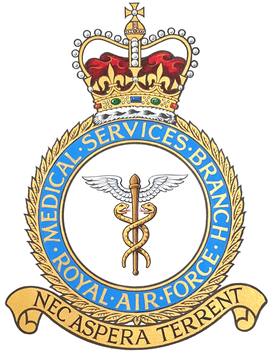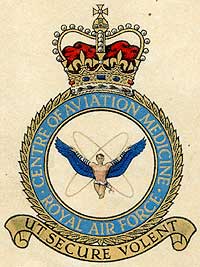Related Research Articles

A flight surgeon is a military medical officer practicing in the clinical field of aviation medicine, which is also occasionally known as flight surgery.

Royal Air Force Cranwell or more simply RAF Cranwell is a Royal Air Force station in Lincolnshire, England, close to the village of Cranwell, near Sleaford. Among other functions, it is home to the Royal Air Force College (RAFC), which trains the RAF's new officers and aircrew. The motto, Altium Altrix, meaning "Nurture the highest" appears above the main doors of the Officers Mess. Since January 2023, RAF Cranwell has been commanded by Group Captain Tina Jessup.

Royal Air Force Henlow or more simply RAF Henlow is a Royal Air Force station in Bedfordshire, England, equidistant from Bedford, Luton and Stevenage. It houses the RAF Centre of Aerospace Medicine and the Joint Arms Control Implementation Group (JACIG), and was home to the Signals Museum, which closed in June 2024. It formerly hosted light aircraft flying and 616 Volunteer Gliding Squadron. The Ministry of Defence announced on 6 September 2016 that the base is set to be closed. As of January 2024, the closure and disposal of the station is expected to take place from 2026. Flying activity ceased in July 2020.

Aviation medicine, also called flight medicine or aerospace medicine, is a preventive or occupational medicine in which the patients/subjects are pilots, aircrews, or astronauts. The specialty strives to treat or prevent conditions to which aircrews are particularly susceptible, applies medical knowledge to the human factors in aviation and is thus a critical component of aviation safety. A military practitioner of aviation medicine may be called a flight surgeon and a civilian practitioner is an aviation medical examiner. One of the biggest differences between the military and civilian flight doctors is the military flight surgeon's requirement to log flight hours.
The Flight Surgeon Badge is a military badge of the United States Armed Forces which has existed to designate Flight Surgeons since the Second World War.

Royal Air Force North Luffenham or more simply RAF North Luffenham is a former Royal Air Force station in Rutland, England. It is near to the villages of Edith Weston and North Luffenham.

An aircrew flying badge is the badge worn on the left breast, above any medal ribbons, by qualified aircrew in the Royal Air Force, Royal Navy, British Army, Indian Air Force, Pakistan Air Force, Royal Canadian Air Force, Royal Australian Navy, Australian Army, Royal Australian Air Force, Royal New Zealand Air Force, South African Air Force and Sri Lanka Air Force. An example of a real pilot brevet is shown:

A hypobaric chamber, or altitude chamber, is a chamber used during aerospace or high terrestrial altitude research or training to simulate the effects of high altitude on the human body, especially hypoxia and hypobaria. Some chambers also control for temperature and relative humidity.

MoD Boscombe Down(ICAO: EGDM) is the home of a military aircraft testing site, on the south-eastern outskirts of the town of Amesbury, Wiltshire, England. The site is managed by QinetiQ, the private defence company created as part of the breakup of the Defence Evaluation and Research Agency (DERA) in 2001 by the UK Ministry of Defence (MoD).

The Royal Air Force Institute of Aviation Medicine was a Royal Air Force aviation medicine research unit active between 1945 and 1994.
Sir Menelaos (Mene) Nicolas Pangalos is a British neuroscientist of Greek descent.
Air vice-marshal John "JE" Ernsting was a senior Royal Air Force (RAF) commander and renowned medical researcher.

The Royal Air Force Medical Services is the branch of the Royal Air Force that provides health care at home and on deployed operations to RAF service personnel. Medical officers are the doctors of the RAF and have specialist expertise in aviation medicine to support aircrew and their protective equipment. Medical officers also carry out Aeromedical evacuations, providing vital assistance on search-and-rescue missions or emergency relief flights worldwide.

No. 38 Group RAF was a group of the Royal Air Force which disbanded on 31 December 2020. It was formed on 6 November 1943 from the former 38 Wing with nine squadrons as part of RAF Transport Command. It was disbanded on 31 January 1951, but re-formed on 1 January 1960, became part of RAF Air Support Command in 1967 and then, in 1972, the air support group within RAF Strike Command. It was temporarily disbanded from 18 Nov 1983 to 31 Oct 1992 and from 1 April 2000 to 1 July 2014. It subsequently became part of RAF Air Command, bringing together the Royal Air Force’s Engineering, Logistics, Communications and Medical Operations units. Air Officer Commanding No. 38 Group was also responsible for UK-based United States Visiting Forces (USVF) units and for RAF personnel attached to other global armed forces.

The RAF Centre of Aviation Medicine is a medical organisation run by the Royal Air Force and based at RAF Henlow in Bedfordshire. It is the main organisation conducting aviation medicine research in the UK.

Air Marshal Sir Harold Edward Whittingham was a British physician notable for a distinguished medical career in the Royal Air Force and contributions to Aviation medicine. After graduating from the University of Glasgow, he was the first pathologist and Assistant Director of Research at the Beatson Institute for Cancer Research in Glasgow.
Air Vice Marshal William Kilpatrick Stewart, was a Scottish researcher in aerospace physiology, senior consultant in physiology to the Royal Air Force, and commanding officer of the RAF Institute of Aviation Medicine.
Air Marshal Sir Kevin James Leeson, is a retired Royal Air Force engineer officer, whose final appointment was as Chief of Materiel – Air at the Defence Equipment and Support organisation, concurrently holding the appointments of Air Member for Materiel on the Air Force Board and Chief Engineer (RAF), at which point he was the most senior non-aircrew officer in the service.

Air Vice Marshal Frederick "Freddie" Charles Hurrell, was a senior medical officer in the Royal Air Force who spent his 35-year military career in aviation medicine and served as Director-General of the RAF Medical Services from 1986 to 1988.

Operation Broadshare is the code name for the British military operation to address the COVID-19 pandemic overseas, primarily in the British Overseas Territories (BOTs) and British overseas military bases. The operation runs in parallel to a similar military operation in the United Kingdom, named Operation Rescript.
References
- 1 2 3 4 5 6 "TOP AWARDS FOR RAF AEROSPACE MEDICINE DOCTORS". mod.uk.
- 1 2 3 4 5 6 7 8 9 Aviation, Space, and Environmental Medicine, Vol. 83, No. 7, July 2012
- ↑ England & Wales, Birth Index, 1916-2005
- ↑ The Eagle, Magazine of Bedford Modern School
- ↑ The London Gazette, 10 February 2004, Supplement, Issue 57201, p. 1701
- ↑ "Archived copy" (PDF). Archived from the original (PDF) on 4 March 2016. Retrieved 20 May 2015.
{{cite web}}: CS1 maint: archived copy as title (link) - ↑ "Top international awards for RAF aerospace doctors". www.gov.uk. Retrieved 20 May 2015.